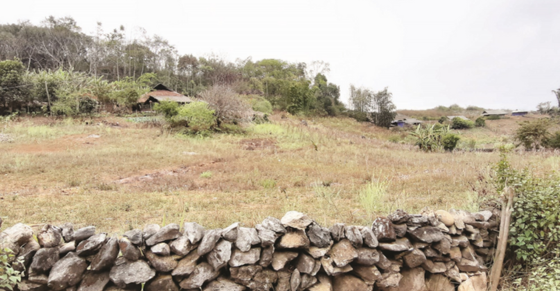02 forms of settling land disputes in which the concerned party does not possess LURC in Vietnam
What are the forms of settling land disputes in which the concerned party does not possess LURC in Vietnam? - Ngoc Chau (Binh Phuoc)

02 forms of settling land disputes in which the concerned party does not possess LURC in Vietnam (Internet image)
Regarding this issue, LawNet would like to answer as follows:
1. 02 forms of settling land disputes in which the concerned party does not possess LURC in Vietnam
For the land dispute in which the concerned party does not possess a certificate or any of the papers prescribed in Article 100 of this Law, the parties may choose between the following two options of settlement:
- Filing a written request for dispute settlement with a competent People’s Committee as prescribed:
+ In case the dispute occurs among households, individuals and communities, the chairperson of the district-level People Committee is responsible for the settlement. If the concerned parties disagree with the settlement decision, they are entitled to lodge a complaint with the chairperson of the provincial-level People’s Committee or to file a lawsuit at a People’s Court in accordance with the law on administrative procedures;
+ In case the dispute involves one party being an organization, a religious institution, an overseas Vietnamese or a foreign-invested enterprise, the chairperson of the provincial-level People’s Committee is responsible for the settlement. If the concerned parties disagree with the settlement decision, they are entitled to lodge a complaint with the Minister of Natural Resources and Environment or to file a lawsuit with a People’s Court in accordance with the law on administrative procedures;
- Filing a lawsuit with a competent People’s Court in accordance with the law on civil procedures;
(Clause 2, Article 203 of the Land Law 2013)
2. Grounds for settlement of land disputes in which the concerned party does not possess LURC in Vietnam
The settlement of land disputes in which the disputing parties have no certificate or any of the papers prescribed in Article 100 of the Land Law 2013 and Article 18 of Decree 43/2014/ND-CP shall be based on the following grounds:
- Evidences on the origin and use process of the land presented by the disputing parties;
- Actual land areas currently used by the parties in addition to the disputed land area and the average land area per household member in the locality;
- Conformity of the current use status of the disputed land parcel with land use master plans and plans already approved by competent state agencies;
- Preferential treatment policies toward persons with meritorious services to the State;
- Regulations on land allocation, land lease and land use rights recognition.
(Clause 1, Article 91, Decree 43/2014/ND-CP)
3. Statute of limitation for second dispute resolution and enforcement of decisions on land dispute resolution in Vietnam
According to Article 90a of Decree 43/2014/ND-CP amended in Decree 01/2017/ND-CP stipulating the statute of limitation for second dispute resolution and enforcement of decisions on land dispute resolution:
- The disputing parties, if opposing the initial decision on dispute resolution, can petition the competent person for second dispute resolution.
If none of the disputing parties petitions the competent person for second land dispute resolution in at most 30 days or in at most 45 days in a mountainous commune, island, remote area or an area (severely) troubled economically and socially upon the receipt of the initial decision on dispute resolution, such decision shall come into force.
- The second decision on land dispute resolution shall come into effect in at most 30 days or in at most 45 days in a mountainous commune, island, remote area or an area (severely) troubled economically and socially upon the receipt of such decision.
Ho Quoc Tuan
- Key word:
- land disputes
- in Vietnam
- Cases of land rent exemption and reduction under the latest regulations in Vietnam
- Economic infrastructure and social infrastructure system in Thu Duc City, Ho Chi Minh City
- Regulations on ordination with foreign elements in religious organizations in Vietnam
- Increase land compensation prices in Vietnam from January 1, 2026
- Determination of land compensation levels for damage during land requisition process in Vietnam
- Who is permitted to purchase social housing according to latest regulations in Vietnam?
-

- Procedures for resolving land disputes under the ...
- 17:00, 21/10/2024
-

- Procedures for settlement of land disputes under ...
- 18:30, 26/09/2024
-

- Emergency response and search and rescue organizations ...
- 10:29, 11/09/2024
-

- Handling of the acceptance results of ministerial ...
- 09:30, 11/09/2024
-

- Guidance on unexploded ordnance investigation ...
- 18:30, 09/09/2024
-

- Notable new policies of Vietnam effective as of ...
- 16:26, 11/04/2025
-
.Medium.png)
- Notable documents of Vietnam in the previous week ...
- 16:21, 11/04/2025
-
.Medium.png)
- Notable documents of Vietnam in the previous week ...
- 16:11, 02/04/2025
-
.Medium.png)
- Notable new policies of Vietnam to be effective ...
- 16:04, 02/04/2025
-
.Medium.png)
- Notable new policies of Vietnam effective from ...
- 14:51, 21/03/2025
 Article table of contents
Article table of contents
